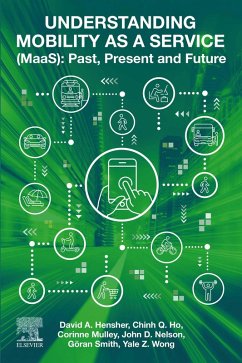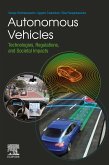Understanding Mobility as a Service (MaaS): Past, Present and Future examines such topics as:
- How likely MaaS will be implemented in one digital platform app
- Whether MaaS will look the same in all countries
- The role multi-modal contract brokers play
- Mobility regulations and pricing models
- MaaS trials, their impacts and consequences
Written by the leading thinkers in the field for researchers, practitioners, and policy makers, Understanding Mobility as a Service (MaaS): Past, Present and Future serves as a single source on all the current and evolving developments, debates, and challenges.
- Includes case studies to show how MaaS is delivered around the world
- Covers foundational aspects of MaaS, clarifying what it is for those new to the concept
- Offers an in-depth analysis on a wide range of MaaS topics including governance, contracts, consumer and supplier preferences, links to societal objectives, the role of trials, assessments, and more
Dieser Download kann aus rechtlichen Gründen nur mit Rechnungsadresse in A, B, BG, CY, CZ, D, DK, EW, E, FIN, F, GR, HR, H, IRL, I, LT, L, LR, M, NL, PL, P, R, S, SLO, SK ausgeliefert werden.
"This book is an important contribution to the growing interest in Mobility-as-a-Service (MaaS). It should be an important reference for academics as well as practitioners in clarifying the concept as well as providing an up to date summary of research on MaaS. Even though all chapters are important contributions, I found the chapter on institutional barriers and governance particularly interesting to read in that it not only describes the challenges associated with but proposes strategies by which the development and diffusion of MaaS could be addressed. I commend the authors for an interesting and stimulating book." --I.C. MariAnne Karlsson, Professor and Head of Division of Design & Human Factors, Department of Industrial and Materials Science - Chalmers University of Technology
"This book is a critical examination of MaaS globally and shows a coherent depth of research that we have not seen to date. It will become the definitive source for MaaS and its honesty and analysis means that it will be a benchmark for the state of MaaS. The chapter on pilot programs for MaaS provides a holistic review of global initiatives that draws on some of the successes and limited wins for MaaS and shows why MaaS has started to work and in some instances why it hasn't succeeded as well as planned, but this feeds directly into the next chapter that then asks the critical question for businesses and cities alike 'What is the potential for MaaS'. I recommend that this book becomes essential reading and reference for all mobility professionals." --Andy Taylor, Strategy Director - Cubic Transportation Systems, Inc.









